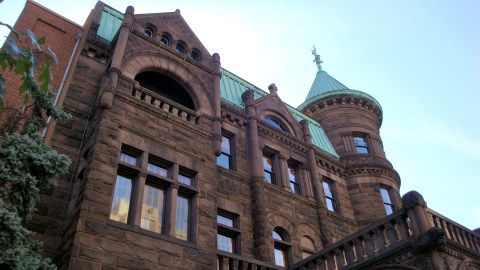Last week, before I began my big cooking blitz, I tried to make a list of things museums should be thankful for, but I came up dry. I’d spent the week trying to beef up my political scanning, and the results were pretty depressing. No matter how the current budget debate is resolved, both parties seem to accept a future in which government support for arts and culture (direct or indirect) is going to stagnate, at best, and possibly radically contract.
Many conservative policy makers frankly state their belief that government shouldn’t be in the business of supporting the arts. Here, for example, is a reply a colleague shared with me in response to an advocacy letter directed to fiscally conservative Senator Rand Paul (R-KY):
September 18, 2012
Dear Mr. _____,
Thank you for taking the time to contact me regarding support for the arts. I am a supporter and patron of the arts, however I think such programs are best supported through the generosity of private citizens and free of government influence and favoritism.
Also, in a time of trillion-dollar government budget deficits, we cannot afford to fund everything the government has funded in the past. I will continue my support for the arts in my community, but I cannot support federal government funding for the arts while adding to the national debt.
Again, thank you for sharing your thoughts on this issue. Please do not hesitate to contact me regarding future federal issues.
Sincerely,
Rand Paul, MD
United States Senator
Well, that’s blunt. It echoes the sentiment I have heard expressed in newspaper comments, and on Twitter. Nina Simon highlightedone such comment from the debate over the millage proposal to support the Detroit Institute of Arts, to wit, “Why don’t all the people who want the DIA to stay open pay fair market value for it?”
However this week, over the transom came an item that reminds me that however dark things sometimes appear, it could be worse. Apparently on Thanksgiving night, Fox News aired a panel discussion about the charitable deduction on Special Report with Bret Baier. A correspondent who transcribed a recording of the show relays that conservative commentator Charles Krauthammer said, in response to another panelist:
“That’s the major argument to retain the (charitable) deduction, because there are so many institutions that need and give and do and this helps them.
But there is another argument that I think is overlooked which is, all the other deductions and credits are ways for the government to influence you, exert its power over you. For example, to buy a house instead of renting, because of the mortgage deduction. Charitable is the only one that’s the opposite.
Charitable is the one where the government — where you choose where the money is to go and the government is sort of adding power to your choices. So it’s strengthening all the institutions that Fred (Barnes) had mentioned, the churches, and the research institutions, the universities, the Rotary Clubs, and these are all the institutions of civil society that stand between the government and the individual.
So whereas the growth of big government over a century has diminished all of these institutions and marginalized them, these are the institutions that are the ones that are sort of the little platoons that stand up against the government.
So I would . . . despite the fact that we have to do a lot of cutting of deductions, the only one I would protect entirely and exempt it from any of these cuts would be the charitable because it’s precisely the thing that in essence drains some of the power out of big government and allows individuals to choose what institutions of civil society it wants to actually empower. I’d keep it for only that reason, as well as the reason, of course, that the institutions that help the needy will need it.”
(Here is the video for the whole segment. It’s worth 6 minutes to watch it.)
So while conservative Republicans, on the whole, want to take the government out of the business of funding arts and culture, they are more than willing to encourage individuals to support nonprofits, as a form of direct populist support of public goods. (And don’t you love the idea of contributions to museums as a form of “sticking it to the man?”)
This is of a piece with the trend towards characterizing contributions as “voluntary taxes.” The recent founding of the Museum of Music by the CEO of Target was cited in an op ed piece yesterday on the NYTimes website as an example of a wealthy “self taxing” to support a social good. (I recommend you follow the public commentary on that op-ed, it is very interesting.)
This is of a piece with the trend towards characterizing contributions as “voluntary taxes.” The recent founding of the Museum of Music by the CEO of Target was cited in an op ed piece yesterday on the NYTimes website as an example of a wealthy “self taxing” to support a social good. (I recommend you follow the public commentary on that op-ed, it is very interesting.)
Does this news qualify as something for which we can give thanks? I’m gonna have to think on that. Personally, I believe that one of the important things we do through government is hash out an understanding of the shared values and priorities that unite us. Personal giving may or may not be a viable way crowdsfunding public goods, but in any case it bypasses the deep, hard, messy and rigorous debate that forces us to explore, justify and maybe change our opinions about what deserves public support and why. As the writer of the op ed piece I cite above says, “the self-tax is at odds with a fundamental democratic principle–the idea that we raise money collectively and then, as a society, collectively choose how we will spend it.”
What do you think?
What do you think?
If you want to weigh in as Congress considers cutting the charitable deduction, you can use this contact form on the Alliance website to send a message to your representative.









The federal tax deduction for charitable donations is irrelevant for most of the small museums I am familiar with. Their typical donor is giving $10 or $20 – or maybe $50 – a year. Their typical donor is the average American taxpayer, who takes the “standard deduction” on their income tax return rather than itemizing, and thus receives no tax benefit from a charitable contribution. The charitable-donation deduction only benefits wealthy individuals who itemize their deductions, and the comparatively well-funded largest museums in the country who are the recipients of these donations.
I find it ironic that the “liberal” politicians – who are generally accused of wanting to “soak the rich to benefit the poor” – are in this instance the leading advocates of giving breaks to the wealthy and supporting large cultural institutions at the expense of everyone else. And I am surprised that an organization such as the AAM – which claims to represent ALL museums – is expending all its lobbying efforts on benefits which will aid only the privileged few.
Thanks for weighing in, dvdexter.
According to the museums (large and small) answering our last financial survey (2009), private charitable giving was the largest source of their operating revenue (37%). Small museums (with operating budgets under under $250k) actually relied more heavily on private charitable donations than did their larger brethren (for which the median portion of income from private donations was only 27%. Given that so much of our support, as a field, comes from private charity, the policies about giving deserve careful attention. Our last couple years of economic impact studies suggest private charity has become even more important during the financial crisis.
According to an analysis of 2009 tax returns, "itemized deductions were claimed on almost 33 percent of all tax returns filed and represented an estimated 61 percent of the total deductions amount" (http://www.cch.com/wbot2012/025AverageItemizedDeductions.asp). 33% of returns reaches pretty deep into the ranks of the middle class, not just the well to do, and probably includes many donors to even small museums.
When Congress starts tinkering with the current system of incentives for supporting nonprofits, museums could quickly find themselves in a heap of pain.
On a broader scale, an attack on the charitable deduction can be seen as an attack on the whole structure of support for the civil sector. What might come next–attacks on tax exempt status per se?
Great stuff guys.
dvdexter, as the Alliance's Assitant Director for Congressional Affairs (which is a fancy title for a lobbyist), I can personally assure you we're not just lobbying on this issue. Please feel free to check out the wide range of our work on behalf of all types and sizes of museums here: https://www.aam-us.org/advocacy/issues
But you're definitely right about one thing: We are fighting tooth and nail to protect the charitable deduction and the museums who depend on it.